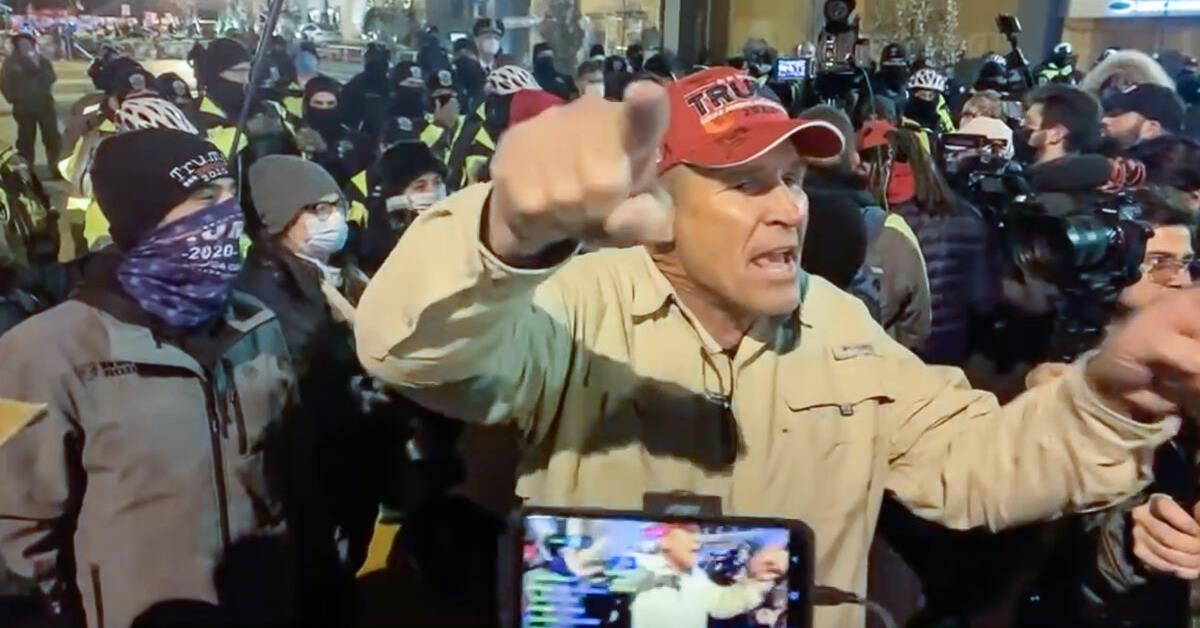Politics
JUST IN: Prosecutors Admit Ray Epps ‘Committed Multiple Crimes,’ Offered Plea Deal Because Of ‘Conspiracy Theories’

Veteran reporter Julie Kelly has obtained a transcript of the sentencing hearing for Ray Epps, a man who was filmed urging people to enter the Capitol at numerous points on January 5 and 6.
Epps — who was also one of the first to protesters to breach Capitol Police lines on January 6 — was given overwhelmingly light treatment from federal prosecutors when compared with the majority of protesters arrested that day. More than three years after the protests, the FBI is serving no-knock raids for demonstrators who are typically charged with four misdemeanors, including disorderly conduct, picketing in the Capitol Building, remaining in restricted grounds and similar trespassing-related misdemeanors.
Hundreds of protesters have also been charged and jailed after being convicted of “obstruction of an official proceeding,” which has been advanced by federal prosecutors under a convoluted legal theory that it currently set to be ruled on by the U.S. Supreme Court. While federal prosecutors have largely stopped charging non-violent protesters with the felony statute, it is still being brought in a number of cases despite the impending Supreme Court ruling.
For Ray Epps, he was charged and pleaded guilty to just one count of disorderly conduct. While hundreds of non-violent protesters with clean records have been sentenced to months or even years in jail, Epps was sentenced to just one year probation and was ordered 100 hours of community service.
According to the sentencing hearing transcript obtained by Julie Kelly, prosecutors admitted that Epps “committed several crimes” on January 6.
“Your honor, Ray Epps has been unfairly scapegoated, but he is not a victim. He was not a secret agent of the government on January 6, trying to trick unwitting Trump supporters into committing federal crimes,” said Assistant U.S. Attorney Michael Gordon during last month’s hearing. “That’s not what happened. But he is not innocent, either.”
Gordon went on to concede that Epps “did not start the riot or cause it, but he did make it much worse.”
I have obtained the transcript from Ray Epps' sentencing hearing earlier this month.
It's a doozy–asst US Attorney Michael Gordon admits Epps committed multiple crimes on January 6. Also lamented Epps being "unfairly scapegoated." pic.twitter.com/4PRxnmIfUt
— Julie Kelly 🇺🇸 (@julie_kelly2) January 23, 2024
“He committed multiple crimes on that day,” the federal prosecutor continued. “He’s only pled to one because that’s the plea offer we made with him. But he committed multiple crimes that day. He was convinced the election has been stolen and that the steal needed to be stopped.”
Gordon further admitted that on January 5, Epps attempted to “persuade” people to enter the Capitol the next day, adding that Epps “did everything he could” to make that happen.
Elsewhere in the transcript, prosecutors explained that they opted not to charge Epps with felony obstruction of an official proceeding and other misdemeanors because he was “the victim of this widespread conspiracy theory that is both false and continuing to be promoted by many.”
This was how prosecutors decided to give Epps a “significant break of a misdemeanor plea offer.”
Epps also submitted an apology letter where he blamed Trump for making him believe in “the big lie.” He also praised the FBI, stating that “the blame of the insurrection is not on the FBI. It is on those who were at the Capitol engaged in insurrectionist activities and those who misled Americans, like myself, into believing the election had been stolen.”
Gordon praised Epps for referring to the protests as an “insurrection” aimed at overturning a “lawful, correct election result.”
LOL apparently Epps wrote a struggle session letter to the judge (as some do) blaming Trump for feeding him "the Big Lie" and insisting the FBI was not responsible for the insurrection. pic.twitter.com/MYonUhQVHY
— Julie Kelly 🇺🇸 (@julie_kelly2) January 23, 2024
Epps has been defended by a number of pro-Biden and corporate media outlets, all of whom defended or downplayed months of left-wing violence in 2020. Said outlets have branded all January 6 protesters as violent “insurrectionists,” though Epps has been spared this treatment.
Instead, he was given a softball interview from 60 Minutes to explain how he is the target of “conspiracy theories.”

